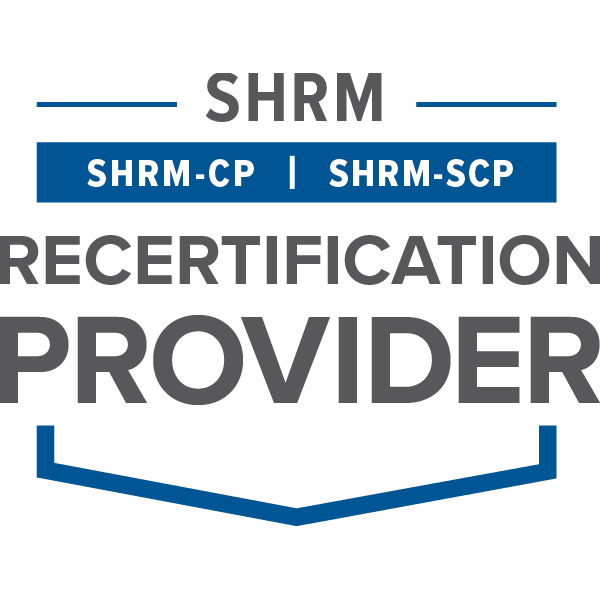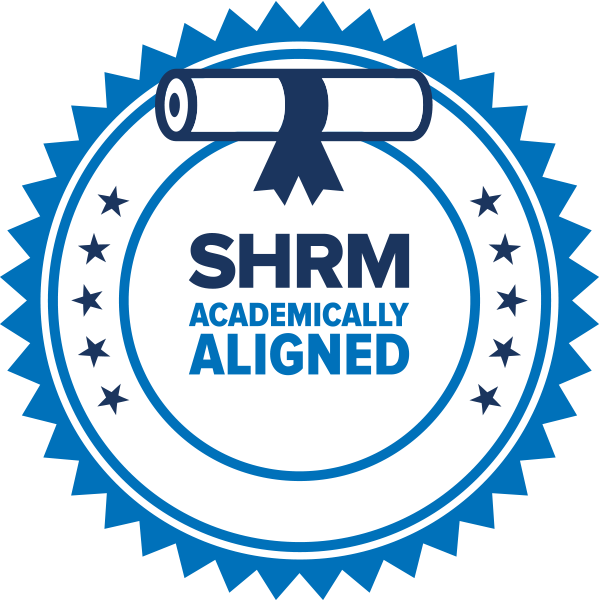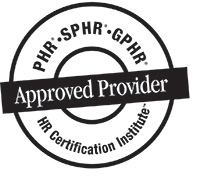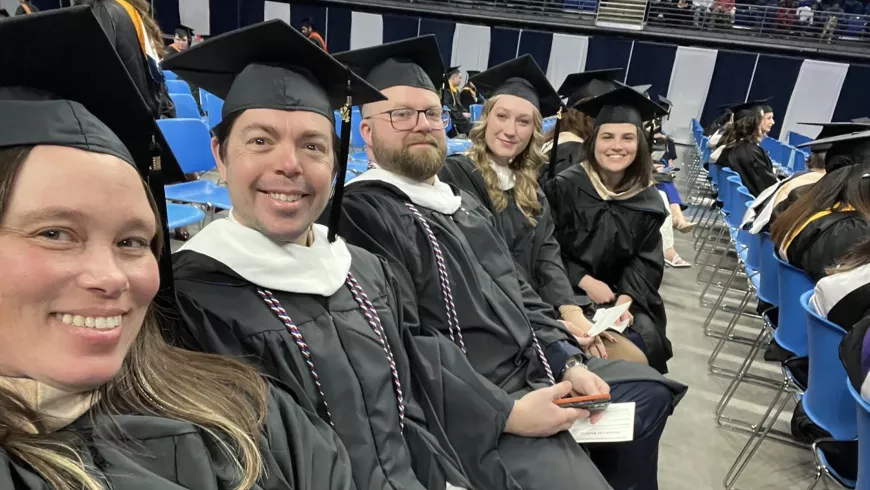100% Online
Complete your Penn State course work at your own pace and 100% online.
Application deadline
Credits and costs
Stackable Credentials
Earn up to 3 certificates while earning your master’s degree.
Gain Strategic Human Resources Management Skills
Analyze the complex human capital, legal, employment, and organizational issues inherent in employment relations, workplace culture, and performance management.
Embed human resources into executive strategic plans and organizational goals.
Navigate emerging trends in employee recruitment and retention in the new era of analytics and AI.
Unlock employee potential, enhance productivity, and improve overall employee engagement.
Meet the challenges of complex employee benefit plans, new labor laws, and emerging employee rights.
Cultivate a corporate culture that promotes career growth, prioritizes employee wellness, and embraces diversity and inclusion.
Online Courses in HR and Employment Relations (HRER)
Online Courses in HR and Employment Relations (HRER)
Courses integrate the disciplines of both human resource management (HRM) and employee relations. The program’s unique holistic approach allows you to analyze workplace challenges and approach problem-solving from different viewpoints.
This future-focused program also highlights the changing nature of the HRER field, including the impact of the globalization of private and public organizations and the growing importance of diversity in the workforce.
You can earn up to three related graduate certificates along the way to your Master of Human Resources and Employment Relations. Students who plan to take the stackable credentials pathway to this degree should follow the course lists for each graduate certificate program. To earn each certificate, you must apply, gain acceptance to the program, and complete the required courses.
- Human Resources and Employment Relations Foundations (12 credits)
- Strategic HR and Workplace Ethics (9 credits)
- Talent Management (9 credits) or Labor and Employment Law (9 credits)
Students who are not pursuing stackable credentials can follow the full course list for the program:
Required Core Courses (18 credits)
- 3credits
Legal context of employment in the United States.
- 3credits
Theory, process, and issues of industrial relations, including collective bargaining and contract administration.
- 3credits
Current human resource topics in the context of organizational strategy, planning, and responsibility.
- 3credits
Research design, sampling design, data collection, and analysis; modeling, means and comparison of means, correlation analysis; and case study.
- 3credits
This course provides students with an overview of selected managerial behavior and career topics in modern organizations.
- 3credits
This course connects Business Strategy, Financial Tools, and HR to an organization's strategic business objectives.
Other Supporting Courses (select 3 credits)
- 3credits
This course examines current human resource management (HRM) systems worldwide and the influence of globalization on HRM practice.
- 3credits
This course will help students understand the importance and significance of advancing diversity, equity, inclusion (DEI) and ethical decision-making in the workplace.
- 1–12credits
Courses offered in foreign countries by individual or group instruction.
Elective Courses (select 6 to 9 credits)*
Tailor your master’s program with electives that align with your professional goals. Topics may change to better meet the industry needs and student demands. Contact the academic home at [email protected] for an updated list. Current topics may include:
- American Labor Unions
- Comparative and International Labor and Employment Law
- Collective Decision-Making
- Diversity in the Workplace
- Ethical Decision-Making
- HR and Employee Relations in the Age of AI
- International HRER
- Labor and Employment Law II
- Labor Union Structure, Administration, and Governance
- Law of Labor-Management Relations
- Leadership Development
- Public Sector Labor Relations
- Strategic Business Tools
- Talent Development
- Talent Management
- Total Rewards
*Students with at least three years of full-time, relevant human resources or employment relations professional work experience at the time of application can waive 3 elective credits, with the graduate program director’s approval.
Culminating Capstone Experience (3 credits)
- 3credits
Supervised student activities on research projects identified on an individual or small-group basis.
All courses must be completed with a grade of C or better and a grade-point average of 3.0 to be awarded the master's degree.
Course Availability
If you're ready to see when your courses will be offered, visit our public LionPATH course search (opens in new window) to start planning ahead.
Advance Your Career

Advance Your Career
About half of the students in the human resources programs are career-changers and working professionals. You can use the knowledge gained from this program and the support of Penn State career resources to pursue careers in a variety of fields, depending on your goals.
Job Titles Related to This Degree
The following roles are often held by people with this type of degree:
- Compensation and Benefits Director
- Human Resources Analyst
- Human Resources Director (HR Director)
- Labor Relations Director
- Talent Management Director
- Training and Development Director
Employment Outlook for Occupational Fields Related to This Degree
Estimates of employment growth and total employment are provided by the U.S. Bureau of Labor Statistics and are subject to change. While these occupations are often pursued by graduates with this degree, individual outcomes may vary depending on a variety of factors. Penn State World Campus cannot guarantee employment in a given occupation.
Human Resources Managers
Training and Development Managers
Compensation and Benefits Managers
Career Services to Set You Up for Success

From the day you're accepted as a student, you can access resources and tools provided by Penn State World Campus Career Services to further your career. These resources are beneficial whether you're searching for a job or advancing in an established career.
- Opportunities to connect with employers
- Career counselor/coach support
- Occupation and salary information
- Internships
- Graduate school resources
Additional School of Labor and Employment Relations Career Services
We strive to put your success first. As a student, you may receive 1:1 career coaching with a Ph.D. faculty member to help you explore your career options. You also gain expanded access to career service resources from both the School of Labor and Employment Relations (LER) and Penn State World Campus, including:
- Student Services Coordinator in the School of LER — find job postings and receive assistance with job searches from our internal office staff
- World Campus Licensed Distance Counselor — learn about careers and internships and access other resources, including career assessments
- The LER alumni group — take advantage of internship opportunities as well as full-time placement opportunities through the largest dues-paying alumni network in the world
Ready to Learn More?
Get the resources you need to make informed decisions about your education. Request information on this program and other programs of interest by completing this form.
Ready to take the next step toward your Penn State master's degree?
Costs and Financial Aid
Costs and Financial Aid
Learn about this program's tuition, fees, scholarship opportunities, grants, payment options, and military benefits.
Costs and Financial Aid
Graduate Tuition
Graduate tuition is calculated based on the number of credits for which you register. Tuition is due shortly after each semester begins and rates are assessed every semester of enrollment.
2025–26 Academic Year Rates
| How many credits do you plan to take per semester? | Cost |
|---|---|
| 11 or fewer | $1,037 per credit |
| 12 or more | $12,448 per semester |
Financial Aid and Military Benefits
Some students may qualify for financial aid. Take the time to research financial aid, scholarships, and payment options as you prepare to apply. Federal financial aid may only be used to pay for credits used to satisfy program requirements.
Military service members, veterans, and their spouses or dependents should explore these potential military education benefits and financial aid opportunities, as well.
Additional Cost of Attendance Details
To view the detailed list of cost of attendance elements:
- visit the Tuition Information site
- click the plus sign to expand the table
- select a semester from the World Campus row
HRER students may apply to be considered for a limited number of scholarships awarded by the School of LER or Penn State World Campus. In addition, students studying online through Penn State World Campus are eligible for student loans. You must meet enrollment and other criteria to qualify. World Campus has a dedicated financial aid office that can help answer your questions and address your concerns.
Technical Requirements
Review the technical requirements for this program.
Earn Stackable Credentials on the Way to Your Degree

Earn Stackable Credentials on the Way to Your Degree
Earn graduate certificates while you work toward your degree. It’s a great way to quickly gain new skills and add valuable credentials to your résumé — without any additional course work, course fees, or application fees.
Finish the following three certificate requirements and the 3-credit capstone course, and you will have completed the requirements to earn your human resources and employment relations master’s degree. Please note that you must apply and be accepted to each program on an individual basis, but you will not be charged application fees for any program beyond the first.
Complete Both of These Certificates (21 credits)
Gain the core competencies in HR management and employment relations needed to solve real-world problems faced by employees, managers, and organizational leaders. This online certificate can help you kick-start a career as an HRER professional or advance your current practice to the next level.
Learn more about the Graduate Certificate in Human Resources and Employment Relations FoundationsDemonstrate and communicate knowledge of strategic human resources and ethics to excel in an HR leadership role. You can complete this fully online graduate certificate program on a part-time basis in about 9 months — while you continue to work.
Learn more about the Graduate Certificate in Strategic Human Resources and Workplace EthicsComplete One of These Certificates (9 credits)
Create a staffing pipeline that drives growth, improves profitability, and delivers a competitive advantage for your organization. This fully online talent management certificate focuses on recruiting strategies, employee benefits, compensation, performance management, and more.
Learn more about the Graduate Certificate in Talent ManagementGain a deeper understanding of labor and employment laws and learn to influence HR policies designed to protect both workers and employers. This online HR certificate covers unfair labor practices, workplace discrimination, termination, occupational safety, FMLA, privacy, and more.
Learn more about the Graduate Certificate in Labor and Employment LawComplete the Culminating Capstone (3 credits)
After the certificate requirements have been met, you just need to complete the 3-credit culminating capstone course to finish the master's degree. You will work closely with an adviser to create a relevant and meaningful project around your specific career goals.
Optional Engagement Opportunities
Optional Engagement Opportunities
This 5-day intensive session allows you to earn credits while enjoying the University Park campus experience. This immersion experience is completely optional and ideal for students who seek a high level of engagement with faculty and peers. Learn more about these optional intensive courses.
Students who seek greater engagement may register for one of our summer courses. These hybrid courses may count as an elective, and include an online, asynchronous component in addition to a week-long immersion at the Penn State University Park campus.
Recognized SHRM Education Partner and HRCI–Approved Provider
Our content areas align with SHRM’s HR Curriculum Guidebook, ensuring you gain a working knowledge on the critical core competencies that the current market demands, including HR strategy, organizational development, consulting, globalization, managing a diverse workforce, and more.
Get even more value from your educational investment. To best support your professional development, qualified students can earn FREE SHRM and HRCI recertification credits as they progress through the program.
SHRM Recertification Provider

SHRM Academically Aligned

Collaborative Learning to Enhance Your Education

The online courses are collaborative, allowing you to build strong ties with other students and gain perspectives from other disciplines and industries. The program maintains maximum flexibility in an effort to meet both the professional needs of individual students and quality academic standards.
Who Should Apply?
Who Should Apply?
If you’re an experienced professional working in HR, labor/employee relations, or organizational development and wish to advance into a leadership role within your organization — or if you’re in a different career and want to make a change — this program is for you.
This program can also be beneficial for professionals who plan to sit for or have already earned various HR professional credential exams, including SHRM-CP® certification, SHRM-SCP® certification, and HRCI-PHR® certification.
Set Your Own Pace

Whether you are looking to finish your program as quickly as possible or balance your studies with your busy life, Penn State World Campus can help you achieve your education goals. Many students take one or two courses per semester and can comfortably complete the program in 24 to 28 months.
Convenient Online Format
This program's convenient online format gives you the flexibility you need to study around your busy schedule. You can skip the lengthy commute without sacrificing the quality of your education and prepare yourself for more rewarding career opportunities without leaving your home.
A Trusted Leader in Online Education

Penn State has a history of more than 100 years of distance education, and World Campus has been a leader in online learning for more than two decades. Our online learning environment offers the same quality education that our students experience on campus.
Information for Military and Veterans

Are you a member of the military, a veteran, or a military spouse? Please visit our military website for additional information regarding financial aid, transfer credits, and application instructions.
How to Apply to Penn State

How to Apply to Penn State
Apply by December 1 to start January 12
Application Instructions
Deadlines and Important Dates
Complete your application and submit all required materials by the appropriate deadline. Your deadline will depend on the semester you plan to start your courses.
Spring Deadline
Apply by December 1 to start January 12Summer Deadline
Apply by April 1, 2026, to start May 18, 2026Fall Deadline
Apply by July 1, 2026, to start August 24, 2026
Steps to Apply
For admission to the J. Jeffrey and Ann Marie Fox Graduate School, an applicant must hold either (1) a baccalaureate degree from a regionally accredited U.S. institution or (2) a tertiary (postsecondary) degree that is deemed comparable to a four-year bachelor's degree from a regionally accredited U.S. institution. This degree must be from an officially recognized degree-granting institution in the country in which it operates.
The MHRER program is suitable for individuals of diverse academic and professional backgrounds. An undergraduate degree in human resources or employment relations is not required to gain admission. Additionally, post-undergraduate, full-time work experience is strongly recommended and preferred. Applicants who are still completing their baccalaureate requirements at the time of application, however, may be admitted to the Graduate School conditional on the awarding of the baccalaureate degree.
All applicants are expected to have earned a junior/senior grade-point average of 3.0 or higher.
You will need to upload the following items as part of your application:
Official transcripts from each institution attended, regardless of the number of credits or semesters completed. Transcripts not in English must be accompanied by a certified translation. If you are a Penn State alum, you do not need to request transcripts for credits earned at Penn State but must list Penn State as part of your academic history.
Test Scores — GRE/GMAT test scores are NOT required.
English Proficiency (if applicable) — The language of instruction at Penn State is English. With some exceptions, international applicants must take and submit scores for the Test of English as a Foreign Language (TOEFL) or International English Language Testing System (IELTS). Minimum test scores and exceptions are found in the English Proficiency section on the Fox Graduate School's "Requirements for Graduate Admission" page. Visit the TOEFL website for testing information. Penn State's institutional code is 2660.
References (1) — You will need to initiate the process through the online application by entering the name, email address, and mailing address of one (1) reference. Upon submission of your application, an email will be sent to the recommender requesting they complete a brief online recommendation regarding your commitment for success in an online program. Please inform the recommender they must submit the form in order for your application to be complete.
Program-Specific Questions/Materials
Résumé — Upload a one- to two-page résumé highlighting your full-time employment and/or military experience to the online application.
Short-Answer Questions — Applicants will be asked to briefly respond to the following 4 questions within the graduate application. The answers to these questions will allow the admissions committees to get to know more about the candidate, their goals, and experiences:
- What are your short-term and long-term education/career goals and how do you expect this program to impact those goals?
- Describe what attracted you to this program and how you think it will support your education and professional aspirations.
- Explain how you are prepared/preparing to succeed in a rigorous graduate program. Discuss your strategies and perceived challenges that you may have related to time management or other relevant factors.
- Give an example of a time in which you received constructive criticism related to your work or study. What was it, who did it come from, and how did you apply it going forward?
To begin the online application, you will need a Penn State account.
Create a New Penn State Account
If you have any problems during this process, contact an admissions counselor at [email protected].
Please note: Former Penn State students may not need to complete the admissions application or create a new Penn State account. Please visit our Returning Students page for instructions.
Stackable Credentials Application Fee Waiver
If you have been previously accepted to a program with stackable credentials, you will not be charged an additional application fee for any associated programs.
Associated programs in the human resources and employment relations stack:
Certificates
- Graduate Certificate in Human Resources and Employment Relations Foundations
- Graduate Certificate in Strategic Human Resources and Workplace Ethics
- Graduate Certificate in Talent Management
- Graduate Certificate in Labor and Employment Law
Degree
- Master of Human Resources and Employment Relations
If you begin with a certificate and are interested in pursuing the Master of Human Resources and Employment Relations, work with your adviser while completing your first certificate to determine which program to apply to next.
Up to 15 credits earned in any of these certificate programs may be transferred to the master's degree, subject to restrictions outlined in GCAC-309 Transfer Credit.
You can begin your online application at any time. Your progress within the online application system will be saved as you go, allowing you to return at any point as you gather additional information and required materials.
- Choose Enrollment Type: "Degree Admission"
- Choose "WORLD CAMPUS" as the campus
Checking Your Status
You can check the status of your application by using the same login information established for the online application form.6. Complete the application.
Admissions Help
If you have questions about the admissions process, contact an admissions counselor at [email protected].
Contact Us

Contact Us
Have questions or want more information? We're happy to talk.
To learn more about the Master of Human Resources and Employment Relations, please contact:
World Campus Admissions Counselors
Phone: 814-863-5386
[email protected]
Erin Hetzel
Phone: 814-867-4167
[email protected]
Learn from the Best
Learn from the Best
The Master of Human Resources and Employment Relations is offered in partnership with the nationally recognized Penn State School of Labor and Employment Relations, which resides within the College of Liberal Arts.
The diverse faculty at the Penn State School of LER is one of the fundamental strengths of the HRER program. You will be taught by:
- accomplished Penn State scholars who research emerging best practices and teach on Penn State's physical campuses
- experienced professionals who are active practitioners in their respective fields and trained to teach in an online environment
These instructors, who help you connect theory to real-world application, have previously held positions as corporate HR department heads, labor and employment lawyers, labor movement professionals, and government and public sector personnel.
School Director
Elaine Farndale
Director, School of Labor and Employment Relations
- DegreePh.D., Cranfield University of Management, United Kingdom
- DegreeM.A., Personnel Management, Kingston University, United Kingdom
- DegreeB.A., French and Modern Dutch Studies, University of Hull, United Kingdom
Dr. Elaine Farndale is director of the School of Labor and Employment Relations and a professor of human resource management. Dr. Farndale's areas of specialization and research include international and comparative human resource management (HRM); the power, professionalism, and roles of the HR department; HRM and firm performance; change management and HRM; eHRM and new HR delivery mechanisms; and HRM and employee engagement. She has presented numerous papers at international conferences and has published articles and chapters in both the practitioner and academic press. Dr. Farndale has also worked as an HR specialist for several years.
Lead Faculty
Brian Redmond
- DegreePh.D., I/O Psychology, Graduate Center, City University of New York
- DegreeM.A., I/O Psychology, New York University
- DegreeB.A., Psychology, Castleton State University
Dr. Brian Redmond is a teaching professor and the lead faculty for labor and human resources and organizational leadership. He worked in several organizations (manufacturing, financial, education, management, and service) before deciding that education was his true calling. He still performs organizational consulting, specifically in the realms of leadership, organizational behavior, and online education. Dr. Redmond teaches and authors courses in leadership that span the undergraduate, graduate, and professional levels. He has been teaching online since 2004. He has published and presented research and applied solutions regarding online education since 2003.
Faculty
Akram Al Ariss
- DegreePh.D., Norwich Business School, University of East Anglia
- DegreeB.S., Engineering, Lebanese American University
Dr. Akram Al Ariss lectures at Champagne School of Management, ESC Troyes in France. His research focuses on international human resource management (IHRM). He has written several book chapters, book reviews, and journal articles — in English, French, and Arabic — on interdisciplinary issues related to IHRM, including articles in British Journal of Management; Thunderbird International Business Review; Career Development International; Work, Employment and Society; and Personnel Review.
Roland L. Bessette
- DegreeJ.D., Michigan State University College of Law
- DegreeB.A., Journalism, Wayne State University
Roland L. Bessette spent 34 years with the federal government as a senior executive (SES) with the Department of Veterans Affairs, Office of General Counsel, in the position of regional counsel (Michigan and Wisconsin), plus a 25-year collateral assignment as a Special Assistant United States Attorney. He was on active duty with the U.S. Navy for eight years. He has provided representation in hundreds of proceedings before the Federal Labor Relations Authority, Equal Employment Opportunity Commission, Merit Systems Protection Board, arbitrators, and various courts.
Carol Cameron
- DegreePh.D., Organization and Management, Capella University
- DegreeMBA, Organizational Behavior, Westminster College
Dr. Carol Cameron has been a corporate leadership and organization development consultant for more than 20 years, working with a range of organizations, from Fortune 500 companies to entrepreneurial start-ups in industries that include health care, financial services, high tech, and more. She transitioned to the academic arena in 2012, joining Harvard University as an internal consultant and executive coach to its deans and department administrators, and leading curriculum design and facilitation efforts for executive education in Harvard's Center for Workplace Development.
Jerry Carbo
- DegreePh.D., Industrial and Labor Relations, Cornell University
- DegreeJ.D., Dickinson School of Law, Penn State
Dr. Jerry Carbo, an associate professor of management at the Grove College of Business at Shippensburg University, teaches courses in business and society, labor relations, and employment law. Dr. Carbo has been an adjunct professor in the Master's in HRER program since 2009. His research interests include socially sustainable business systems, workplace bullying, and union revitalization, and he has published articles in several academic journals, including Journal of Strategic Information Systems, Journal of Workplace Rights, and WorkingUSA.
Jeanne Charles
- DegreeJ.D., DePaul University School of Law
- DegreeB.S., Business, Northern Illinois University
Jeanne Charles has a multi-state Alternative Dispute Resolution practice with offices in the Chicago and Fort Lauderdale areas. Her practice includes both arbitration and mediation services. She serves as a labor arbitrator on permanent panels for the State of Illinois and AFSCME Council 31; the State of Florida and AFSCME Council 79; the Miami Dade County and IAFF Local 1403; the National Treasury Employees Union and IRS; and the United States Postal Service. She has been admitted into the National Academy of Arbitrators.
Steve Greenblatt
- DegreeJ.D., New York Law School
- DegreeMaster's Degree in Labor Law, New York University School of Law
- DegreeB.A., Political Science, Brooklyn College
Steve Greenblatt has spent than 30 years of practice in human resources. At Downstate Medical Center (SUNY) he served as director of labor relations and director of workforce training and development. He also served as ethics officer and acting affirmative action officer. Prior to working with SUNY, he served as assistant district attorney in Bronx County and deputy inspector general for the New York City Department of Sanitation. He also trained attorneys, investigators, and human resource professionals in investigative, arbitration, and trial techniques.
Michael Pepe
- DegreePh.D., Psychology and Education, Washington University in St. Louis
- DegreeM.A., Psychology and Education, Washington University in St. Louis
- DegreeB.S., Business and Marketing, Fairleigh Dickinson University
Dr. Michael Pepe is a senior partner and an executive coach in Meaningful Growth Associates, Inc. Previously, he served in a variety of high-level roles in the areas of human resources, staffing, and development. Among other positions that he has held, Dr. Pepe was the chief human resources officer for Virtua, Inc., and vice president and executive director for the Yale New Haven Health System.
Timothy Shick
- DegreePh.D., Administrative and Leadership Studies
- DegreeM.A., Industrial and Labor Relations, Indiana University of Pennsylvania
- DegreeB.S., Human Resource Management, Indiana University of Pennsylvania
Dr. Timothy Shick has been in the field of human resources for more than 16 years, working in health care, service, and manufacturing settings. He has experience in the private and public sectors, as well. Dr. Shick is a part-time consultant and a lecturer, and he has been a part-time faculty member at Penn State for many years. His major areas of interest are staffing, training, labor and employee relations, and policy.
Rex Simpson
- DegreeJ.D., University of Pittsburgh School of Law
- DegreeB.S., Labor Studies, Penn State
Rex Simpson is a professor of practice in LER. He worked in human resources and employee relations in the retail industry (JCPenney and Macy's), the automotive industry (Honda), and tire manufacturing (Yokohama). He worked in all of the core areas of HR and eventually had responsibility for directing the entire HR operation. Along the way, he also worked as an in-house labor counsel. Prior to his time in private industry, he spent almost five years as a field attorney with the National Labor Relations Board at its Pittsburgh Regional Office.
Banci Tewolde
- DegreeJ.D., University of Maryland School of Law
- DegreeM.A., English, Old Dominion University
- DegreeB.A., English, Metropolitan State College of Denver
Banci Tewolde is an associate director for the Department of Planning and Budget in Virginia. Before joining the Office of the Governor, she was an Assistant Attorney General, where she represented officials and state employees and agencies sued in state and federal courts for alleged constitutional violations in the course of their employment. Prior to returning to Virginia in 2005, she was the manager of the immigration unit at Penn State within the Department of Human Resources.
Maja Vidović
- DegreePost Doc, School of Labor and Employment Relations, Penn State
- DegreePh.D., Faculty of Economics and Business, University of Zagreb, Croatia
- DegreeM.S., Faculty of Economics and Business, University of Zagreb, Croatia
- DegreeB.S., Faculty of Economics and Business, University of Zagreb, Croatia
Dr. Maja (read as Maya) Vidović is a professor, researcher, and enthusiast in the field of human resource management, with a specific focus on international HRM. She is a professor at RIT Croatia, in Zagreb, Croatia, and an adjunct faculty for the School of Labor and Employment Relations. Maja lived in State College on two separate occasions, adding up to two and a half years, both times while working for the School of Labor and Employment Relations, which made her a strong supporter of the school and the program. Maja is a passionate teacher, as recognized through receiving an Excellence in Teaching award from RIT Croatia, and the Kelley-Willits award for outstanding contribution to online programs at Penn State. She is the author of several book chapters and many scientific papers, predominantly focusing on human resource management.
News


